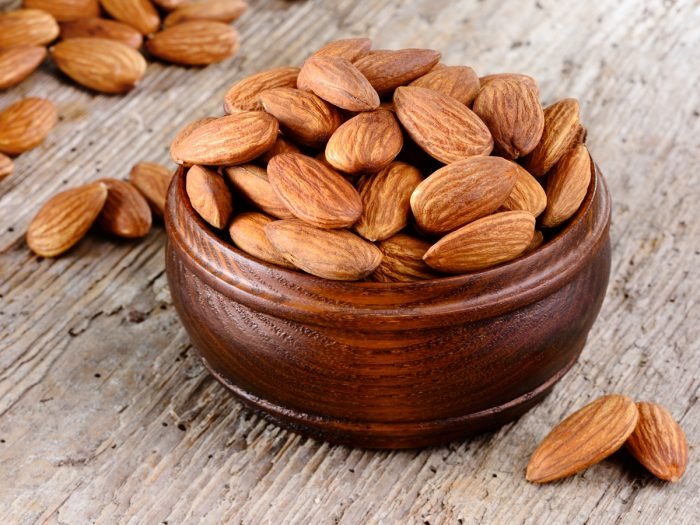
Getting good sleep is incredibly important for your overall health. It may reduce your risk of developing certain chronic illnesses, keep your brain and digestion healthy and boost your immune system. It’s generally recommended to get between 7 and 9 hours of uninterrupted sleep each night, though many people struggle to get enough. There are many strategies you can use to promote good sleep, including making changes to your diet, as some foods have sleep-promoting properties.
Here are some best foods you can eat before bed to enhance your sleep quality.
Almonds

They are an excellent source of many nutrients, as one ounce contains, it has 32 % of magnesium that help improving sleep quality. Magnesium’s role in promoting sleep is thought to be due to its ability to reduce inflammation. Additionally, it may help reduce levels of the stress hormone cortisol, which is known to interrupt sleep. Eating almonds regularly has been associated with lower risks of a few chronic diseases, such as type 2 diabetes and heart disease. Almonds are a source of the sleep-regulating hormone melatonin.
Turkey
It is high in protein, providing 4 grams per ounce (28 grams). Protein is important for keeping your muscles strong and regulating your appetite.It contains the amino acid tryptophan, which increases the production of the sleep-regulating hormone melatonin. Due to its high content of protein and tryptophan, both of which may induce tiredness that helps in sound sleep
Chamomile tea

Chamomile tea is a popular herbal tea that may offer a variety of health benefits. It is well known for its content of flavones, a class of antioxidants that reduce inflammation that often leads to chronic diseases, such as cancer and heart disease. Specifically, chamomile tea contains apigenin, an antioxidant that binds to certain receptors in your brain that may promote sleepiness and reduce insomnia.

Kiwis are a low-calorie and very nutritious fruit. One medium kiwi contains only 50 calories and a significant amount of nutrients, including 117% of your daily needs for vitamin C and 38% for vitamin K.
Furthermore, eating kiwis may benefit your digestive health, reduce inflammation and lower your cholesterol. These effects are due to the high amount of fibre and carotenoid antioxidants that they provide. According to studies on their potential to improve sleep quality, kiwis may also be one of the best foods to eat before bed. The sleep-promoting effects of kiwis are thought to be due to their content of serotonin, a brain chemical that helps regulate your sleep cycle. It has also been suggested that the antioxidants in kiwis, such as vitamin C and carotenoids, may be partly responsible for their sleep-promoting effects. This is thought to be due to their role in reducing inflammatio
Fatty Fish–
Fatty fish, such as salmon, tuna, trout and mackerel, are incredibly healthy. What makes them unique is their exceptional vitamin D content. For example, a 3.5-ounce (100-gram) serving of salmon contains 525–990 IU of vitamin D, which is over 50% of your daily needs. Additionally, fatty fish are high in healthy omega-3 fatty acids, specifically EPA and DHA, both of which are known for reducing inflammation. Omega-3 fatty acids may also protect against heart disease and boost brain health. The combination of omega-3 fatty acids and vitamin D in fatty fish have the potential to enhance sleep quality, as both have been shown to increase the production of serotonin, a sleep-promoting brain chemical
This effect was thought to be due to the vitamin D content of the salmon. Those in the fish group had higher levels of vitamin D, which was linked to a significant improvement in sleep quality.
White Rice

White rice is a grain that is widely consumed as a staple food in many countries. The major difference between white and brown rice is that white rice has had its bran and germ removed, which makes it lower in fiber, nutrients and antioxidants. Nevertheless, white rice still contains a decent amount of a few vitamins and minerals. A 3.5-ounce (100-gram) serving of white rice provides 14% of your daily needs for folate, 11% for thiamin and 24% for manganese. It has been suggested that eating foods with a high glycemic index, such as white rice, a few hours before bed may help improve sleep quality.
Several other foods have sleep-promoting properties, but they have not been studied specifically for their effects on sleep.
- Milk: Another known source of tryptophan, milk has been shown to improve sleep in the elderly, especially when taken along with melatonin and paired with exercise.
- Bananas: Bananas contain tryptophan and are a good source of magnesium. Both of these properties may help you get a good night’s sleep..
- Oatmeal: Similar to rice, oatmeal is high in carbs and has been reported to induce drowsiness when consumed before bed. Additionally, oats are a known source of melatonin.
Getting enough sleep is very important for your health.
Fortunately, several foods may help, thanks to their content of sleep-regulating hormones and brain chemicals, including melatonin and serotonin. Additionally, some foods contain high amounts of specific antioxidants and nutrients, such as magnesium, that are known to enhance sleep by helping you fall asleep faster or stay asleep longer.
To get a detailed guidelines or a personalized plan for your health problems you can contact directly, In the pandemic my online consultations are on Contact details mentioned below, Happy to help always.
Be Happy Be healthy and Be safe too

